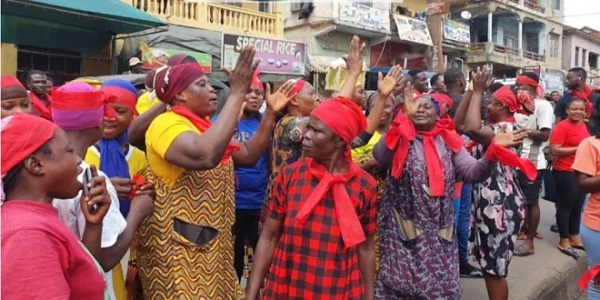Kumasi Traders, A group of merchants who ply their businesses within and around the Central Business District of Kumasi (Adum) have lamented their businesses are on the verge of collapse just like the Ghanaian economy.

The group who identify themselves as members of the Ashanti Business Community and traders in Fast Moving Consumer Goods (FMCG) alluded their woes to the “high and unrealistic” tax sysem of the economy, high rate of borrowing, low gross margin, high inflation rate and forex hikes.
During a press conference on Wednesday, October 12, 2022, the Executive Secretary of the community, Charles Kusi Appiah Kubi, said the FMCG industry is the biggest market in the small and medium scale enterprise (SME) space and holds 80% share of all markets in Ghana.
He noted that the dynamics in the FMCG market makes it attractive to business thereby making it a target for government’s source of revenue.
The FMCG market is one of the largest markets with the longest supply chain in Ghana. It has a high revenue turnover as such it is assumed to be very profitable market. The industry is one of the biggest employing market in the SME space. It holds about 80% share of all markets in Ghana. The dynamics in the market makes the market more attractive to business. This perception has created a certain impression to governments upon governments as the first to go to revenue mobilisation,” he said.
However, he bemoaned the lowest gross margins of FMCG across the country and beyond which hovers between GH₵5 to GH₵10.
He also disclosed that the maximum business survival period of the market is 10years, 5years for retailers and 6years for wholesalers.
He further stated that the value added tax (VAT) system was a threat to the survival of their businesses but their recommendations to government have fallen on deaf ears.
“We have demonstrated to government that the 4% VAT flat rate do not sync with the dynamics in the FMCG sector and recommended tax policies that would help government optimise its revenue mobilisation whiles promoting self-compliance.
“We were so optimistic government was going to heed to our recommendation in last year’s budget reading only for us to wake up with another complex tax regime; VAT standard rate which has 6% as levy for businesses whose sales threshold is greater than Ghc500k per year”,he said.
He added saying that when government is unable to meet its revenue target due to the excruciating VAT system, government tend to vent its frustration on the FMCG market and accuse them of evading taxes or under declaring their sale invoices.
They, therefore, called on government to review the VAT regime and take its revenue from the entry points of goods or from domestic factories and to stop revenue collectors from visiting their shop daily.
They promise to use legitimate means to have their grievances addressed by government and relevant stakeholders.

